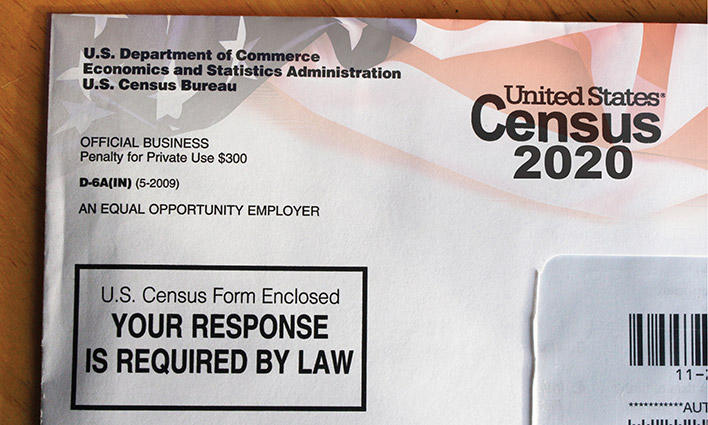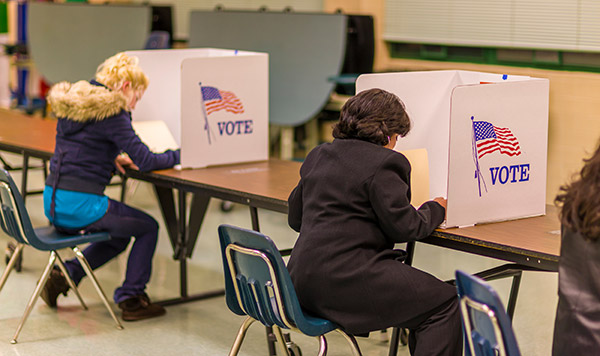
At a school unflinchingly focused on issues of justice, it should go without saying that our community staunchly believes in participating in the political system. “Democracy has never come easy, and none of us can afford to sit on the sidelines,” says Karol V. Mason, President of John Jay College. That’s why John Jay participated in the All In Campus Democracy Challenge to increase voter registration and turnout. The College’s continual efforts are showing positive results. On November 12 All In recognized the College with a Silver Campus Seal Achievement for increasing voter participation by 34 percent in the 2018 Midterm Election.
John Jay is now focusing on educating the community about the importance of participating in the upcoming 2020 Census. “The data collected in the 2020 Census will determine the amount of federal funding our communities will receive for health care, housing, education, and more,” says Mindy Bockstein, Executive Director of the Office of External Affairs. “Unfortunately misinformation about the Census poses challenges for us to achieve a complete count, but at John Jay we’re working to clear up that misinformation and reduce the fear surrounding the Census. We want to make sure all members of the John Jay Community and their families are counted.”

“Democracy has never come easy, and none of us can afford to sit on the sidelines.” —Karol V. Mason
To learn more about the effort to increase voter and Census participation, we sat down with Bockstein, and other members of the John Jay Community involved in the efforts. Makeda Jordan, the Associate Director of the Center for Student Involvement & Leadership (CSIL), and Andrew Berezhansky ’21, a junior representative on Student Council, filled us in on their roles with JJC Rocks the Vote. While Nikki Gupton, CSIL’s Student Life Specialist, dispelled the myths surrounding the Census and shared how the 2020 Census can impact all of our lives.
Can you talk about the history of John Jay student voter registration and voter turnout?
Jordan: John Jay College’s voter registration rates have always been close to the national average. For instance, in 2014, we had 61 percent of our students registered to vote, while the national average was 69.9 percent. But voter turnout hasn’t always followed that same trend. In 2016, only 17 percent of our students made it to the polls. In 2018, we saw that number go up, when 51 percent of our students voted in the midterm elections. That difference of 34 percent garnered us a Silver Seal from the All In Challenge. The challenge recognizes colleges and universities across the U.S. for their commitment to increasing student voting rates. In the hopes of increasing registration and turnout numbers for the 2020 election, next semester, we’re adding additional voter registration drives to the calendar, and will host debate parties and forums on the importance of civic engagement.
“One way that we can counteract apathy is by inspiring young people to mobilize, informing them about what’s at stake, and teaching them how to hold their elected officials accountable.” — Makeda Jordan
Why do you think young people—even those who are politically motivated—sometimes fail to vote?
Jordan: Young people and people from underrepresented communities can become apathetic when it comes to politics and voting because they feel nothing will change in their communities. They’ve seen their neighborhoods struggling through countless administrations and promises of change. One way that we can counteract apathy is by inspiring young people to mobilize, informing them about what’s at stake, and teaching them how to hold their elected officials accountable.
Berezhansky: From a student perspective, I think young people, even those who are politically active, fail to vote because they don’t see the candidate they want running. They want elected officials that will represent and fight for them, and work to get policies passed that better their communities.
What has been your role in increasing voter registration and voter turnout for John Jay students?
Bockstein: The Office of External Affairs proudly collaborated with a number of groups on campus, including CSIL, which helped with registration efforts. On the event front, we organized and hosted several forums featuring leaders in government, including New York State Assemblymembers Marcos Crespo ’03 and Catalina Cruz ’05 and New York State Senator Zellnor Myrie, Chair of the Senate Committee on Elections. Our goal for these forums was for students to hear from these local leaders about the power and importance of civic engagement, especially with respect to communities of color.
“The next Census count will take a snapshot of all people living in the United States starting April 1, 2020.” —Mindy Bockstein
Regarding the 2020 Census, can you tell us what the Census is and why it’s important for everyone to be counted?
Bockstein: The Census is a population count that happens every 10 years. The next Census count will take a snapshot of all people living in the United States starting April 1, 2020. The data that is collected in the Census matters because it determines how many elected officials get to represent each state in Congress, the distribution of power, and the amount of funding communities receive from the federal government. This funding includes money for social services, health care, housing, education, and more. The State of New York and New York City have a disproportionally large number of people in hard-to-count communities. And, with more than $650 billion in federal funds at stake, it’s important that everyone is counted.
Are John Jay students fully informed on what the Census is and how it can directly impact their lives?
Gupton: I think we have a mixed group of students who are informed about the Census and some that don’t fully understand it because of the myths and misinformation that have been circulated about it. Students are very concerned about their private information being shared, especially in regards to their immigration status. We’re hoping to dispel these myths and are working to inform students on the Census. We want students and their loved ones to know that the information they provide in the Census cannot be shared with anyone under Title 13 of the United States Code. The Census responses can only be used to produce statistics and not against individuals.
“We want students and their loved ones to know that the information they provide in the Census cannot be shared with anyone under Title 13 of the United States Code.” —Nikki Gupton
What Census outcomes do you think students need to understand better?
Gupton: Everyone needs to know that there is a lot at stake. And, if people don’t complete the Census, boundaries for congressional and state legislative districts will be redrawn, which can result in the loss of Congressional seats and funding for public services. This means losing funding for public education [public schools], senior centers, public housing, Head Start programs, and Medicaid, and receiving less funding will affect the most underserved and underrepresented communities.
What partnerships have been critical to you and your team in order to improve the Census count in terms of outreach?
Gupton: The City University of New York [CUNY] has been a great partner in this effort. They’ve given trainings to staff members and have provided additional resources that enable us to better engage the community and get the word out about the Census. Our partnership with the Office of External Affairs, and other groups and departments across the College, have also been essential to our outreach work. My hope is for us to connect with non-profits and other government agencies to better promote the Census over the next few months.
Tell us about the CUNY Census Corps. How will the program help the John Jay community understand the importance of being counted in the Census?
Bockstein: John Jay is part of the CUNY Census Corps program, which encourages participation in every community. The program is the result of a partnership between CUNY and NYC Census 2020. Through the CUNY Census Corps program students will educate, engage, and mobilize members of their community, with the goal of having everyone in New York counted.
“If people don’t complete the Census, boundaries for congressional and state legislative districts will be redrawn, which can result in the loss of Congressional seats and funding for public services.” —Nikki Gupton
Gupton: I, along with Richard Pusateri from Military and Veteran Services, will be overseeing John Jay’s Census Corps group on campus. We’ll be doing various activities during the Spring 2020 semester, such as tabling to inform John Jay students that the Census is occurring and the importance of participating in it. We will also be hosting events during “Census Week” which begins March 30 and celebrating “National Census Day” on April 1. Census Corps students will also get a chance to engage, in a more hands-on way, with their communities while working with nonprofit organizations.



